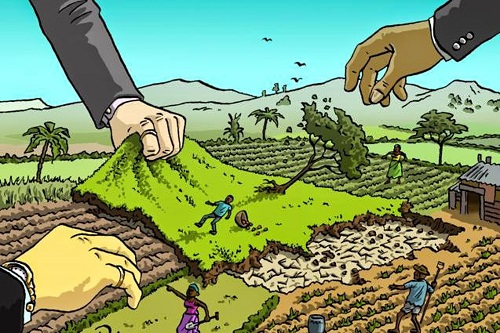By
Alem Hailu G/Kristos
When people are imbued with a spirit that a resource, say an arable land, is mine, there will be no effort spared to protect it. Nor will they be remiss from throwing their full weight behind optimizing the benefits they could derive from it. The coupling of the aforementioned motivational factors—sense of ownership and optimizing returns—ensures the sustainability of resources and the containment of starvation, which normally attends population explosion, through a bumper harvest.
Of their volition, planting trees, citizens try to stave off land denudation simultaneously enjoying the benefits that accrue thereof. Using the transaction value of the land for a collateral agreement, they could borrow money from financial institutions to develop their land. They could also rent it to someone who could optimize the benefits to be derived from it using capital, technological knowhow and bent. Entrepreneurship too will get a launching pad.
If they are stripped of the transaction value of their land, alienated from their resources, citizens will be economically weak. Even micro finance institutions could shun them fearful that they could not collect their money.
In cognizance of this fact, more often than not governments that come to power lavish to grab land, for citizens, easily turning malleable could knuckle under their whims and caprices.
As the conditions citizens find themselves in make them objects of blackmail such governments or leading parties exploit the situation to commit political corruption. With a stick-and-carrot approach they make a point rallying many behind their party and muffling the complaints people want to voice. Especially in towns, if the government is corrupt land grab will be evidenced. Worse still if the corrupt government is highly dominated by a given ethnic group a tacit ethnic cleansing could occur. Most of the towers that engulfed Addis in a short period of time could corroborate this fact.
Also the exorbitant land lease price make the bureaucratic labyrinthine insufferable. Pursuant of land, investors have to bribe officials prone to corruption. To make up for expenditures, investors create price-hikes on consumers thereby making the taming of inflation a daunting task. Say for instance if an investor has a tower s/he will rent the rooms with expensive prices. Needless to mention, the lodger increases the price of his/her commodities and services. Ultimately it is consumers that suffer the brunt side of the stick.
This way a government that has a go-ahead to administer citizens for a limited period could create a long-lasting negative impact on the life of citizens. Also the master plan for urban land development must be consulted while lands are given to investors.
The country has no dearth of arable land. Government ownership of land and farmers use-license must not prohibit citizens from moving from one state to another and prove productive investing their skills, capital and talents on arable lands. Arresting people’s mobilization with a land-use license is a subtle way of promoting ethnicity-charged politics. This problem is felt reflected in some parts of the country.
Hence, conducting a public discourse to rectify things is mandatory. The bottom line is that land must not be taken as an instrument of subjugation.
The land-use system too should also come to the center-stage. It must be clear how much of its land the country devotes for agriculture and how much of it for forest coverage. Lands that suffered long service especially in the northern part of the country must be allowed to rejuvenate.
The think-thank group the nation envisages to bring into play in the wake of the wind of political change that has wafted across the country must also ponder on this burning issue to throw light on ways forward.
Alem Hailu G/Kristos
A published poet, novelist, editor, translator of masterpieces, literary critic, playwright and journalist from Ethiopia. M.A holder in literature, Addis Ababa University.
Looking for a traditional publisher of a collection of poems. My novel: ‘Hope from the debris of hopelessness’.



No Comments Yet!
You can be first to comment this post!